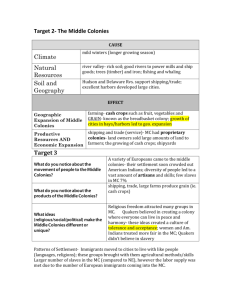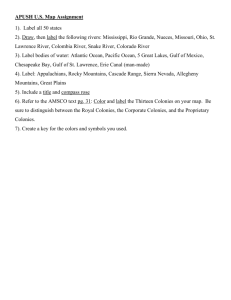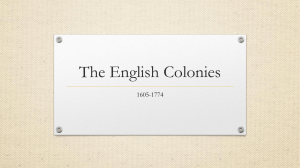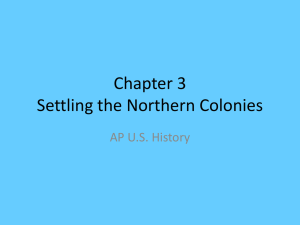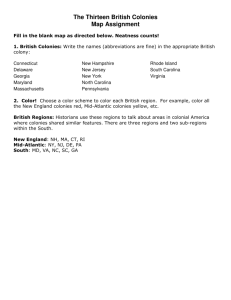The Middle Colonies
advertisement
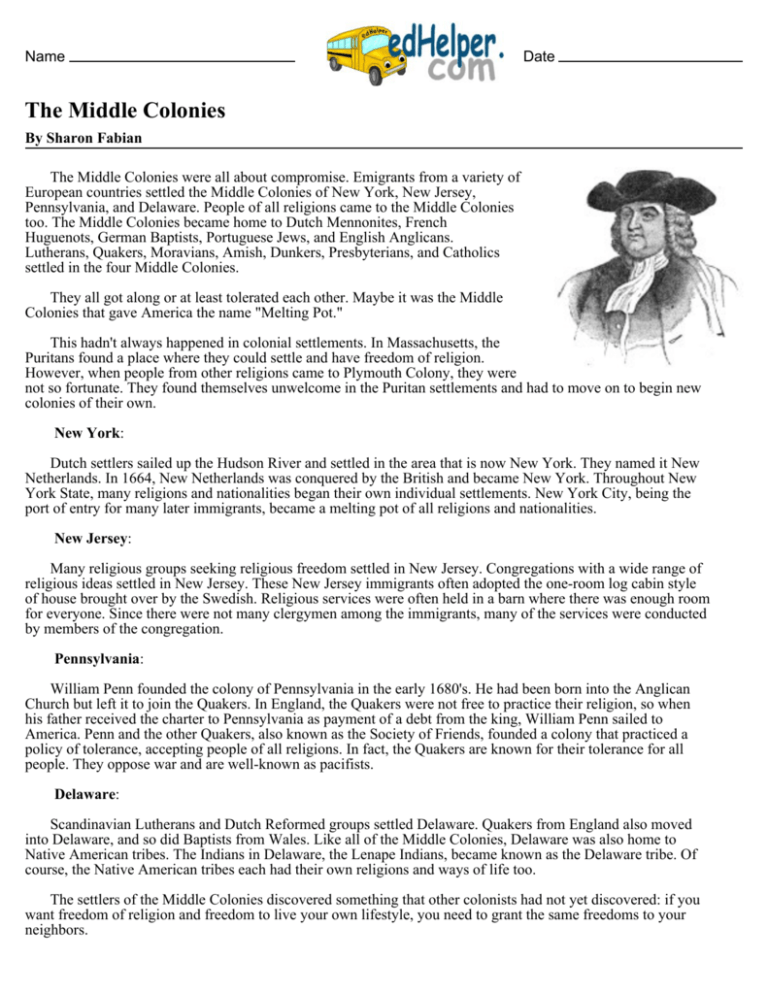
Name Date The Middle Colonies By Sharon Fabian The Middle Colonies were all about compromise. Emigrants from a variety of European countries settled the Middle Colonies of New York, New Jersey, Pennsylvania, and Delaware. People of all religions came to the Middle Colonies too. The Middle Colonies became home to Dutch Mennonites, French Huguenots, German Baptists, Portuguese Jews, and English Anglicans. Lutherans, Quakers, Moravians, Amish, Dunkers, Presbyterians, and Catholics settled in the four Middle Colonies. They all got along or at least tolerated each other. Maybe it was the Middle Colonies that gave America the name "Melting Pot." This hadn't always happened in colonial settlements. In Massachusetts, the Puritans found a place where they could settle and have freedom of religion. However, when people from other religions came to Plymouth Colony, they were not so fortunate. They found themselves unwelcome in the Puritan settlements and had to move on to begin new colonies of their own. New York: Dutch settlers sailed up the Hudson River and settled in the area that is now New York. They named it New Netherlands. In 1664, New Netherlands was conquered by the British and became New York. Throughout New York State, many religions and nationalities began their own individual settlements. New York City, being the port of entry for many later immigrants, became a melting pot of all religions and nationalities. New Jersey: Many religious groups seeking religious freedom settled in New Jersey. Congregations with a wide range of religious ideas settled in New Jersey. These New Jersey immigrants often adopted the one-room log cabin style of house brought over by the Swedish. Religious services were often held in a barn where there was enough room for everyone. Since there were not many clergymen among the immigrants, many of the services were conducted by members of the congregation. Pennsylvania: William Penn founded the colony of Pennsylvania in the early 1680's. He had been born into the Anglican Church but left it to join the Quakers. In England, the Quakers were not free to practice their religion, so when his father received the charter to Pennsylvania as payment of a debt from the king, William Penn sailed to America. Penn and the other Quakers, also known as the Society of Friends, founded a colony that practiced a policy of tolerance, accepting people of all religions. In fact, the Quakers are known for their tolerance for all people. They oppose war and are well-known as pacifists. Delaware: Scandinavian Lutherans and Dutch Reformed groups settled Delaware. Quakers from England also moved into Delaware, and so did Baptists from Wales. Like all of the Middle Colonies, Delaware was also home to Native American tribes. The Indians in Delaware, the Lenape Indians, became known as the Delaware tribe. Of course, the Native American tribes each had their own religions and ways of life too. The settlers of the Middle Colonies discovered something that other colonists had not yet discovered: if you want freedom of religion and freedom to live your own lifestyle, you need to grant the same freedoms to your neighbors. Name Date The Middle Colonies Questions 1. The Middle Colonies do not include ______. A. New York B. Pennsylvania C. Delaware D. Virginia 2. The Middle Colonies became known for religious ______. A. tolerance B. services C. leaders D. persecution 3. People of various religions who came to the colonies around Plymouth, Massachusetts found religious freedom. A. true B. false 4. Native Americans had no religion before the European settlers arrived. A. false B. true 5. New York was settled by the ______. A. Portuguese B. Dutch C. Quakers D. Mennonites 6. Religious services in colonial New Jersey were often held in a barn because of its ______. A. décor B. location C. size D. temperature 7. Based on the information in the article, you could infer that the ______ would be opposed to the War in Iraq. A. Quakers B. Baptists C. Mennonites D. Huguenots 8. People from all of the following places, except ______, lived in colonial Delaware. A. Scandinavia B. North America C. Vietnam D. Holland Name Date Explain why the Middle Colonies can be called a "melting pot." Why do you think conflicts arose between people of different religions in some of the colonies? What are some things that they might have disagreed about?

